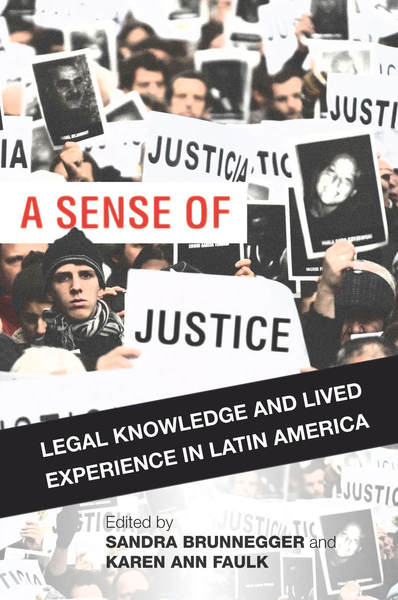
2016
240 pages.
from $35.00
Paperback now $17.50 (50% off)
Hardcover ISBN: 9780804797962
Paperback ISBN: 9780804799072
Ebook ISBN: 9780804799119
Throughout Latin America, the idea of "justice" serves as the ultimate goal and rationale for a wide variety of actions and causes. In the Chilean Atacama Desert, residents have undertaken a prolonged struggle for their right to groundwater. Family members of bombing victims in Buenos Aires demand that the state provide justice for the attack. In Colombia, some victims of political violence have turned to the courts for resolution, while others reject the state's ability to fairly adjudicate their grievances and have constructed a non-state tribunal. In each of these examples, the protagonists seek one main thing: justice.
A Sense of Justice ethnographically explores the complex dynamics of justice production across Latin America. The chapters examine (in)justice as it is lived and imagined today and what it means for those who claim and regulate its parameters, including the Brazilian police force, the Permanent Peoples' Tribunal in Colombia, and the Argentine Supreme Court. Inextricable as "justice" is from inequality, violence, crime, and corruption, it emerges through memory, in space, and where ideals meet practical limitations. Ultimately, the authors show how understanding the dynamic processes of constructing justice is essential to creating cooperative rather than oppressive forms of law.
About the authors
Sandra Brunnegger is Fellow and Lecturer at St. Edmund's College, Cambridge.
Karen Ann Faulk is Research Professor at the Colegio de México.
"Combining rich ethnographic studies from Latin America, A Sense of Justice enriches our understanding of how different legal subjectivities are produced and 'justice' is understood in contexts of complex legal pluralism. It heralds important new debates in legal anthropology and the anthropology of human rights."
—Rachel Sieder, Centro de Investigaciones y Estudios Superiores en Antropología Social (CIESAS), Mexico
"A Sense of Justice responds to the unique challenges of understanding justice as plural, decentered, and often in tension with formalized state-centered systems of law in Latin America. By privileging the everyday uses and consequences of justice in action and closely examining actors' own experiences of injustice and search for remedy, this superb book goes beyond its focus on Latin America, setting a wider agenda for an anthropology of justice."
—Ronald Niezen, McGill University
"From rural and urban experiences in Argentina, Bolivia, Brazil, Chile, and Colombia, A Sense of Justice explores the discursive uses and everyday practices of justice by courts, police, indigenous peoples, citizens, and victims. Aspiring to create an anthropology of justice, this book explores imaginative efforts to rescue justice from its institutionally inaccessible form into something that is meaningful for Latin Americans."
—Leigh Payne, University of Oxford